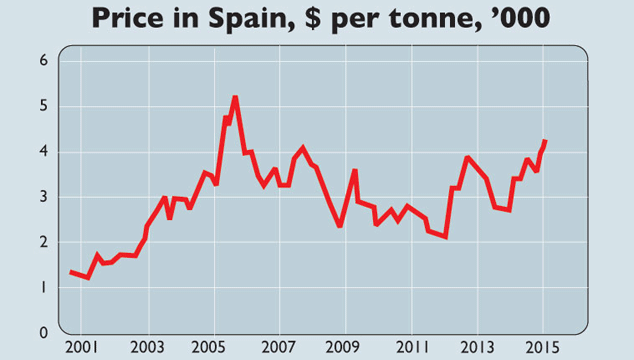Chart of the week: A sharp rise in the price of olive oil
Consumer prices for olive oil have climbed by an average of 10% worldwide this year due to drought and disease in southern Europe.

Get the latest financial news, insights and expert analysis from our award-winning MoneyWeek team, to help you understand what really matters when it comes to your finances.
You are now subscribed
Your newsletter sign-up was successful
Want to add more newsletters?

Twice daily
MoneyWeek
Get the latest financial news, insights and expert analysis from our award-winning MoneyWeek team, to help you understand what really matters when it comes to your finances.

Four times a week
Look After My Bills
Sign up to our free money-saving newsletter, filled with the latest news and expert advice to help you find the best tips and deals for managing your bills. Start saving today!

Salad dressings are getting ever more expensive. Consumer prices for olive oil have climbed by an average of 10% worldwide this year due to drought and disease in southern Europe. In Spain and Italy, which jointly account for 70% of the world's olive oil, production has fallen by around 50% owing to unusually hot weather and a bacterial disease known as "olive ebola". In two southern Italian provinces where the disease is rampant, officials have declared a "state of calamity". The bug has now reached olive groves in Corsica.
Meanwhile, demand remains buoyant, with retailers and distributors keen to buy 12% more olive oil than exporters were able to deliver last month, says Sarah Butler in The Guardian. Stockpiles in Spain are now at "critically low levels", according to industry researcher Oil World. Prices have jumped to near-record highs, with the main benchmark, Spanish oil, at over $4,200 a tonne, a level not seen since 2006.
MoneyWeek
Subscribe to MoneyWeek today and get your first six magazine issues absolutely FREE

Sign up to Money Morning
Don't miss the latest investment and personal finances news, market analysis, plus money-saving tips with our free twice-daily newsletter
Don't miss the latest investment and personal finances news, market analysis, plus money-saving tips with our free twice-daily newsletter
Get the latest financial news, insights and expert analysis from our award-winning MoneyWeek team, to help you understand what really matters when it comes to your finances.

-
 Pension Credit: should the mixed-age couples rule be scrapped?
Pension Credit: should the mixed-age couples rule be scrapped?The mixed-age couples rule was introduced in May 2019 to reserve pension credit for older households but a charity warns it is unfair
-
 Average income tax by area: The parts of the UK paying the most tax mapped
Average income tax by area: The parts of the UK paying the most tax mappedThe UK’s total income tax bill was £240.7 billion 2022/23, but the tax burden is not spread equally around the country. We look at the towns and boroughs that have the highest average income tax bill.